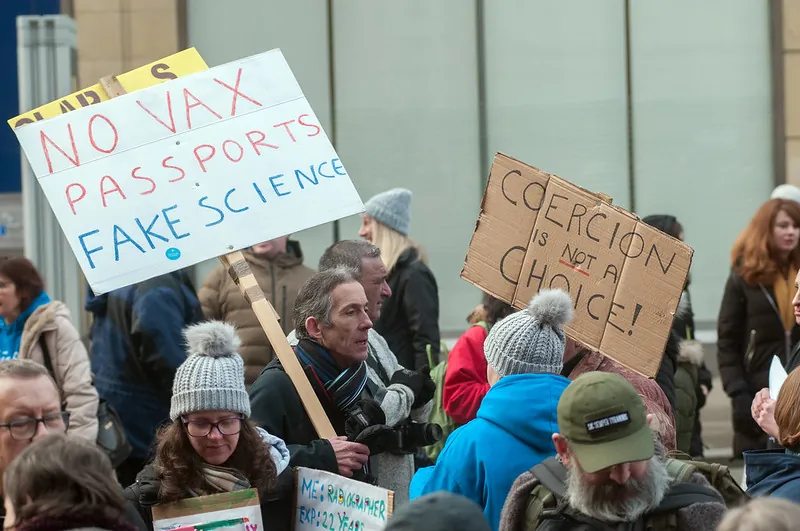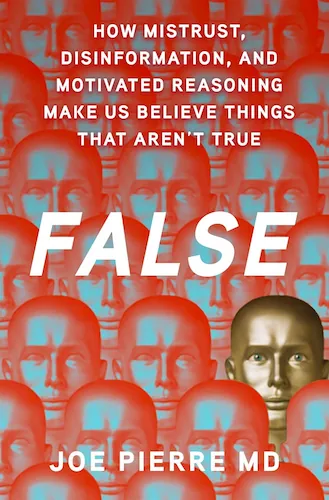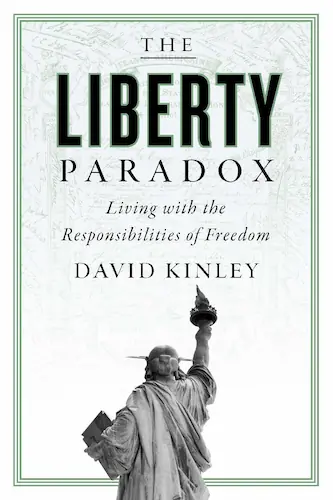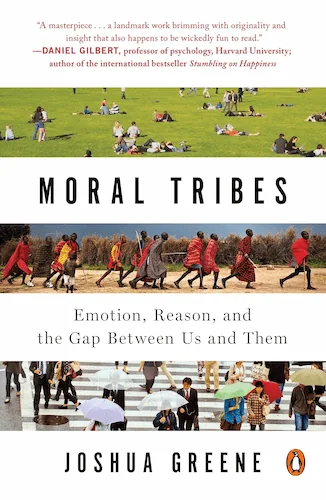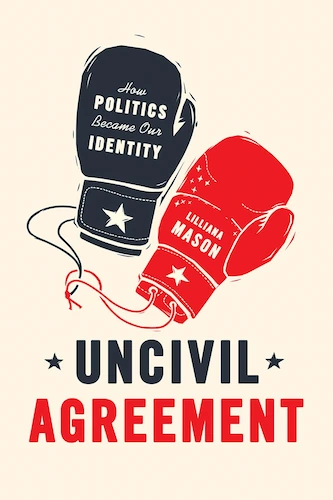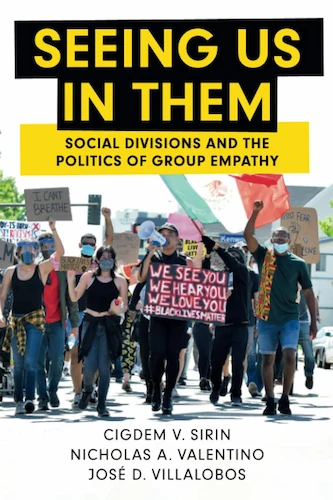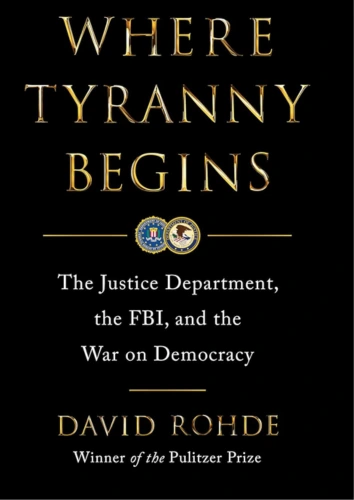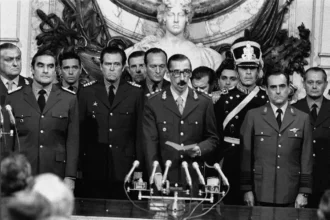False Beliefs Are Running Rampant, But Not Because of Mass Delusion
As a psychiatrist, I’ve spent my career working with patients who have delusions—that is, false beliefs held with unassailable conviction like believing that one is the Second Coming of Christ or that the FBI has implanted a tracking device in one’s brain. Such beliefs can wreak havoc on an individual’s life and in some cases lead to violence or suicide.
But as is increasingly obvious these days, eminently consequential false beliefs held with unwarranted conviction are in no way limited to those with mental illness. And with the potential for them to upend people’s lives and relationships, pave the way for autocratic regimes to trample over democracy, and imperil our children and the entire planet, we’re all at risk of suicide by false belief.
To avoid succumbing to suicide by false belief, we cannot allow ourselves to become complacent or complicit, to accept defeat, or to normalize a post-truth world.
Here’s a short list of the kind of false beliefs I’m talking about. The 2020 Presidential election was stolen. In recent years, violent crime has been at an all-time high. Immigrants were eating cats and dogs in Ohio last summer. One hundred and fifty-year-olds are collecting social security. Scientists are receiving funding to make transgendered mice. Vaccines cause autism. Climate change is a hoax.
None of these claims are true. And yet, a sizeable proportion of the country believes them, at least to some degree. The rest are divided between those who scoff at their ridiculousness and others who aren’t sure what to believe. While it might be tempting to conclude that this split means that our ideological opposites are suffering from mass delusion or mass psychosis, that’s not what’s going on here. Let me explain.
Why Do We Believe Things That Aren’t True?
It’s true that, like delusions, these beliefs are not only false, but demonstrably false. But unlike delusions, they’re not self-referential (they’re not beliefs about the believer) and they’re not conclusions based on the subjective experiences of disordered minds.
Instead, they’re beliefs about the world that, by and large, are told to us by others or read online, whether their authors happen to believe them or not.
Although Kellyanne Conway euphemized such beliefs as “alternative facts” back in 2017, they are of course not facts at all, but untruths and in some cases, outright lies.
It’s not delusional to believe things that people tell us are true. And it’s not a lack of intellect, education, or critical thinking skills that explain our ideological opposites. But there are other psychological reasons why we believe things that aren’t true and often hold onto those beliefs so tightly.
In my book False: How Mistrust, Disinformation, and Motivated Reasoning Make Us Believe Things That Aren’t True, I explain in detail the various mechanisms that make it so easy for all of us to fall victim to false belief at times.
These include heuristics and cognitive biases as well as more specific phenomena like the Dunning-Kruger effect, the illusory truth effect, cognitive dissonance, intuitive as opposed to analytical thinking, and even something called bullshit receptivity. To be clear, these are foibles that we all have, albeit to varying degrees.
Mistrust and Misinformation
While each of these cognitive quirks offer explanations for specific false beliefs on an individual level, they fall short of providing an over-arching account of false belief and are often mistakenly portrayed as if they’re flaws or character failings that only apply to those with whom we disagree.
As with patients suffering from delusions, a healthy democracy cannot flourish if it allows itself to be guided by a pageant of falsehoods.
A less pathological, and therefore more humanizing and universal perspective, is that false beliefs are better understood according to what I call the “3M Model” based on mistrust, misinformation, and motivated reasoning.
Over the past few decades, mistrust of traditionally trusted sources of knowledge including the media, scientific experts, and other institutions of epistemic authority has been escalating while fueling a rising tide of authoritarian populism across the world. There are many reasons why.
Sometimes mistrust of people and institutions is earned through trust violations like conflicts of interest, corruption, or scandal. Other times, it’s unwarranted and rooted in racial prejudice, denialism, or frank paranoia. And all too often, there’s someone telling us to be mistrustful, while encouraging us to trust them instead.
Explore Books Written by Our Contributors
Regardless of the cause, losing faith in experts and institutions of knowledge results in a vulnerability to misinformation that’s ubiquitous in the world today. When we’re “just asking questions,” “looking for answers,” and “doing our own research,” it’s easy to be led astray. Let’s face it—these days, with misinformation and deliberate disinformation sitting right alongside accurate information and designed to look like the real thing, it’s often difficult to tell the difference.
Whether it’s cable news commentaries, Google searches, YouTube videos, or AI-generated images and answers, it has become harder to determine what’s real or reliable anymore. It’s for this reason that some claim that we now live in a post-truth world.
Motivated Reasoning in the Post-Truth World
Mistrust explains why we discount facts and scientific consensus, while misinformation accounts for how we find alternative facts and untruths (or how they find us). But it’s motivated reasoning and the related phenomenon of confirmation bias—turning our attention and giving greater weight to information that supports what we already believe while ignoring or discounting information that refutes it—that allow us to fall so easily into groupthink according to our ideological tribes.
Our post-truth world should be understood more as a deliberate political strategy than an individual state of mind.
It’s because of motivated reasoning that liberals think that CNN and MSNBC are outstanding sources of information, while Fox News and OANN are terrible and conservatives believe the opposite. And it’s this relationship between motivated reasoning and informational sources that has made Republicans more likely than Democrats to be on the wrong side of truth on hot-button issues these days, such as those that decided the 2024 Presidential election.
Motivated reasoning also explains how we can so quickly turn to hypocrisy (declaring that elections were rigged when Trump lost in 2020, but were A-okay when he won again) and why two people can judge the same information or events with completely opposite perspectives (like the president’s meeting with Ukrainian President Volodymyr Zelensky or his address to Congress earlier this year). It accounts for how we can believe something based on the flimsiest evidence or a lone contrarian opinion (like that the current measles outbreak is caused by vaccines, not a lack of vaccination).
And finally, motivated reasoning helps to clarify that the post-truth world doesn’t mean that people no longer care about what’s true, but rather that we don’t or won’t agree on what’s true anymore. Any semblance of a shared reality has been replaced by a tale of two alternate realities whereby each side of any debate can defend their beliefs according to their own informational sources.
The Politicization and Harm of False Beliefs
False beliefs always carry at least the potential for harm. While some are relatively innocuous (like the claim that the Earth is flat), others—like those related to vaccines and climate change—can prove to be deadly. In between those two extremes, false beliefs stemming from disinformation can be used to further erode trust in reliable sources of information, fuel support of anti-establishment demagogues, and incite people to back anti-democratic political movements.

If that sounds familiar, it’s because we wouldn’t be where we are today without the weaponization of false belief. Indeed, our post-truth world should be understood more as a deliberate political strategy than an individual state of mind.
Of course, falsehoods in the form of political rumors, propaganda, and conspiracy theories have been around forever, as have dictatorships, autocracies, oligarchies, and kakistocracies. But in our lifetimes here in the US, the exploitation of false beliefs to justify foolhardy and downright harmful public policies has rarely posed the existential threat that it does now.
Gutting scientific research, eliminating social services, and deporting those living in the US legally without due process shouldn’t be partisan issues.
In 2020, we had the Big Lie. But now, in 2025, we have not just one, but an entire portfolio of Big Lies. Immigrants—even those here legally—are little more than rapists and gang members. People with autism will never contribute anything to society. Vaccines are more harmful than the diseases they’re designed to prevent. The federal government is so broken that the only way to fix it is to raze it to the ground. Fact-checking is censorship.
In the first 100 days of Trump 2.0, such false claims have been used to justify one perilous policy decision after another:
- Over 200 people without criminal records, including some like Kilmar Abrego Garcia who have been living legally in the US, have been deported to prison in El Salvador without due process over the objection of the US Supreme Court. In a recent interview, President Trump insisted that Garcia had “MS-13” tattooed on his knuckles despite evidence to the contrary.
- Robert F. Kennedy Jr., who has built a career trafficking in vaccine myths, halted future vaccine development as the new head of the Department of Health and Human Services. Then he appointed another notorious antivaxxer to conduct a study to take a new look at the already thoroughly debunked claim that vaccines cause autism. More recently, he validated the “chemtrail” conspiracy theory, adding that he would “do everything in [his] power to stop it.”
- A concerted effort to defund biomedical research is in full swing while Jay Bhattacharya, the new director of the National Institutes of Health, has declared a culture of scientific denialism disguised as healthy dissent.
- Driven by the same kind of denialism, all references to climate change have been scrubbed from government websites.
- The National Science Foundation has pulled the plug on research investigating misinformation and disinformation in the name of “free speech.”
- Under the guise of efficiency and cost-cutting measures, the richest person in the world, Elon Musk, has taken a hatchet to government agencies that previously had regulatory oversight of his own business ventures.
- The second richest person in the world, Jeff Bezos, has interceded with the major newspaper he owns to restrict the topics of op-ed pieces while claiming to support personal liberties and free speech.
- Social media sites have all but abandoned fact-checking.
Truth, Justice, and a Better Tomorrow
Just how many people believe the falsehoods that support such brazen policy moves, or how much they believe them, isn’t clear. In the end, it probably doesn’t matter. The only thing that matters is that there’s enough doubt that far too many of us aren’t bothering to object.
Gutting scientific research, eliminating social services, and deporting those living in the US legally without due process shouldn’t be partisan issues. But here we are. Meanwhile, the list of such policies goes on with little evidence of abatement. And it’s hardly alarmist to say that things are likely to get worse—much worse.
As with patients suffering from delusions, a healthy democracy cannot flourish if it allows itself to be guided by a pageant of falsehoods. If we continue to ignore facts, objective news reporting, and scientific consensus, we will not survive four years of autocracy intent on dismantling government institutions, or the next global pandemic, or another decade of the hottest temperatures ever recorded on the planet.
To avoid succumbing to suicide by false belief, we cannot allow ourselves to become complacent or complicit, to accept defeat, or to normalize a post-truth world. America will never be great again if we let that happen. Borrowing from another slogan, we must instead fight for truth, justice, and a better tomorrow.


